How Much Caffeine in English Breakfast Tea
When you pour yourself a cup of English Breakfast tea, you're typically consuming about 40-70 milligrams of caffeine per 8 oz serving. However, this amount can vary depending on factors such as the brand, brewing time, and strength of the tea. To put this in context, English Breakfast tea generally has less caffeine than a cup of coffee, which contains roughly 95-200 milligrams of caffeine per 8 oz.
The following table breaks down the average caffeine levels found in an 8 oz cup of English Breakfast tea:
| Brewing Time | Expected Caffeine Content |
|---|---|
| 1 minute | 14-20 milligrams |
| 3 minutes | 20-35 milligrams |
| 5 minutes | 35-70 milligrams |
Keep in mind, the longer you steep the tea, the more caffeine is extracted. Thus, if you're sensitive to caffeine or looking to reduce your intake, you might want to steep your tea for a shorter period. On the other hand, if you are seeking a more robust flavor and a caffeine boost, a longer steep time might be your preference. Just remember that English Breakfast tea is a blend of several black teas, which are all known to have higher caffeine levels compared to other tea varieties like green or herbal teas.
Bestsellers
Comparison to Other Teas
When considering the caffeine content in English Breakfast tea, it's valuable to compare it with other popular teas such as Green Tea, Herbal Tea, and various Black Tea Varieties.
Green Tea
Green Tea typically contains approximately 25 to 29 milligrams of caffeine per 8 oz cup. In contrast, your English Breakfast tea generally holds more caffeine, with about 40 to 70 milligrams per 8 oz serving. The difference arises because Green Tea is less oxidized than Black Tea, affecting the caffeine levels.
Herbal Tea
Herbal Teas, such as chamomile, peppermint, and rooibos, usually have no caffeine at all. When you choose English Breakfast tea, you're opting for a caffeinated start to your day unlike these herbal counterparts.
Black Tea Varieties
Within Black Tea varieties, the caffeine content can vary:
- Assam: Often bold in flavour, it can contain roughly 60 to 90 milligrams of caffeine per 8 oz cup.
- Darjeeling: With a more delicate taste, it usually has about 40 to 70 milligrams per 8 oz.
- Ceylon: Averages a caffeine content similar to English Breakfast tea, ranging from 50 to 90 milligrams per 8 oz.
Your English Breakfast tea falls into the middle range of these Black Tea varieties, providing a moderate caffeine kick compared to the stronger Assam or the milder Darjeeling.
Brewing Time Influence on Caffeine Levels
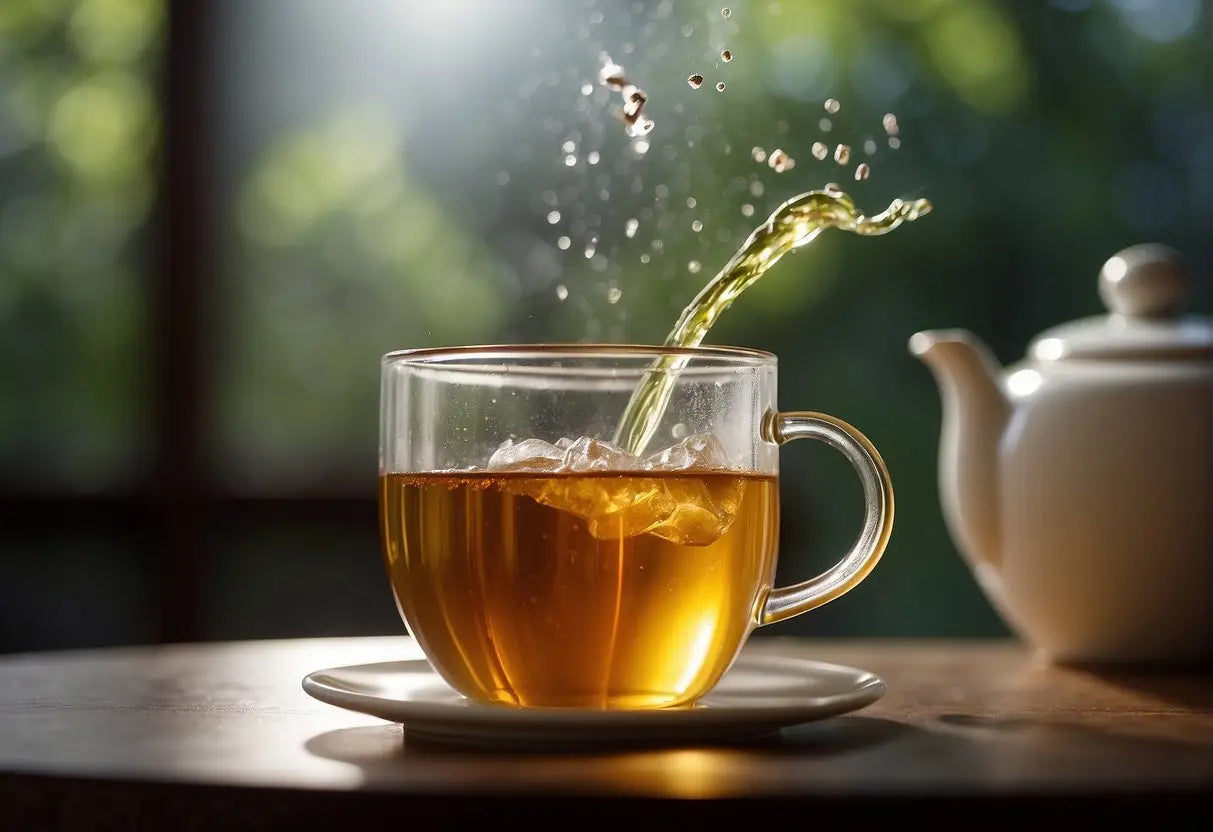
When you brew English Breakfast tea, the length of time you allow the tea leaves to steep significantly affects the caffeine content of your beverage.
Shorter Brewing Times (1-2 minutes):
- Lower caffeine content
- Ideal for a mild lift
Standard Brewing Time (3-5 minutes):
- Moderate caffeine content
- Commonly recommended for a balanced flavor and caffeine level
Extended Brewing Times (5+ minutes):
- Higher caffeine content
- Stronger taste and increased stimulation
A crucial point to remember is that steeping tea for longer than 5 minutes can lead to a point of diminishing returns regarding flavor versus caffeine content. The table below illustrates typical caffeine ranges based on brewing time.
| Steeping Time | Estimated Caffeine Content |
|---|---|
| 1-2 minutes | 14-29 mg |
| 3-5 minutes | 30-48 mg |
| 5+ minutes | 49-70 mg |
To ensure consistency in your caffeine intake, try to steep your tea at a consistent temperature (usually around 100°C or 212°F for English Breakfast tea) and use the same amount of tea leaves each time. Adjust the brewing time to suit your preferred balance of taste and desired caffeine level.
Lao Ban Zhang
Factors That Affect Caffeine Content
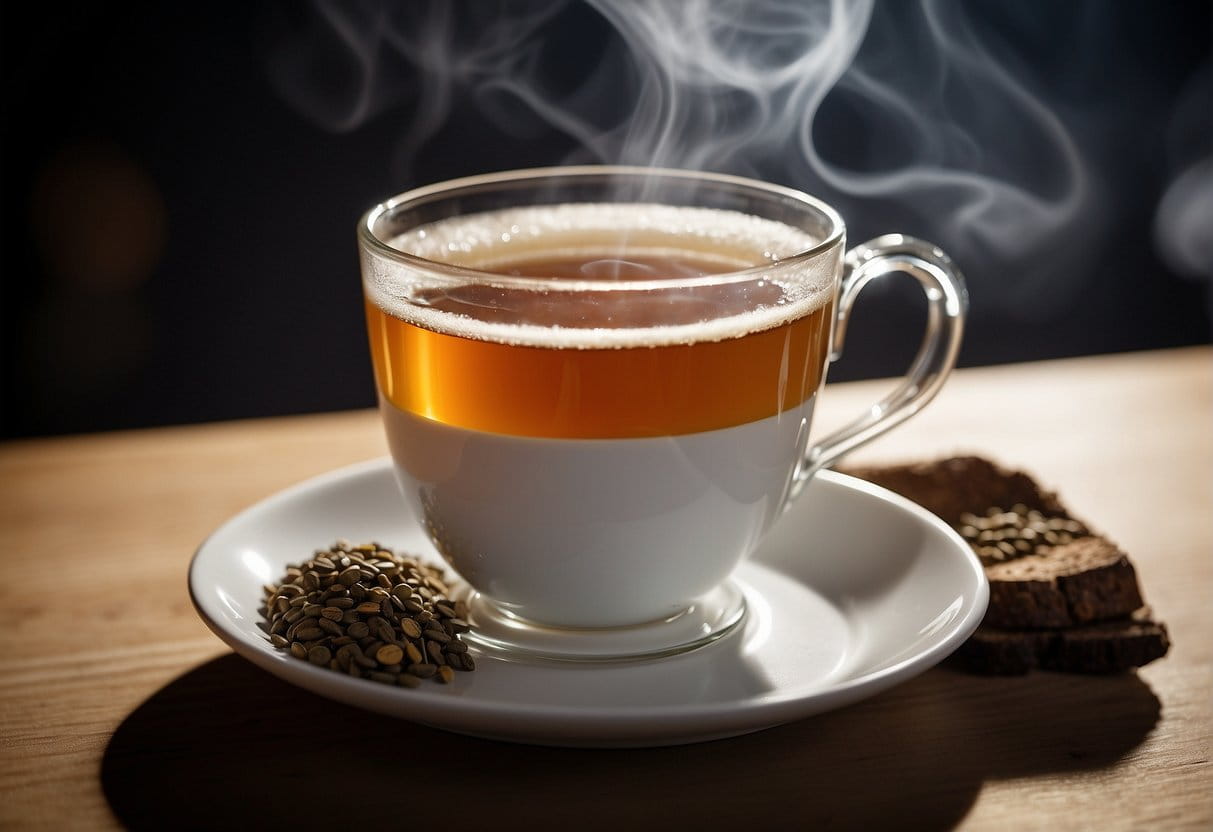
Caffeine levels in English Breakfast tea can vary considerably. Understanding the key determinants will help you manage your caffeine intake more effectively.
Tea Leaves vs Tea Bags
- Tea Leaves: Loose leaf English Breakfast tea typically contains more caffeine than tea bags because the leaves have more surface area exposed during brewing, which allows more caffeine to be released.
- Tea Bags: The tea found in bags is often smaller or broken, resulting in a faster infusion and release of caffeine, but the total caffeine content is usually less compared to loose leaves.
Serving Size
- Cup Size: A standard cup size (8 oz) of English Breakfast tea contains roughly 30 to 60 milligrams of caffeine, but a larger serving size will proportionally increase your caffeine intake.
- Amount of Tea: Using more tea leaves or tea bags per cup will also increase the caffeine content. It's important to measure your tea portions to get a consistent caffeine level per cup.
Health Implications of Caffeine
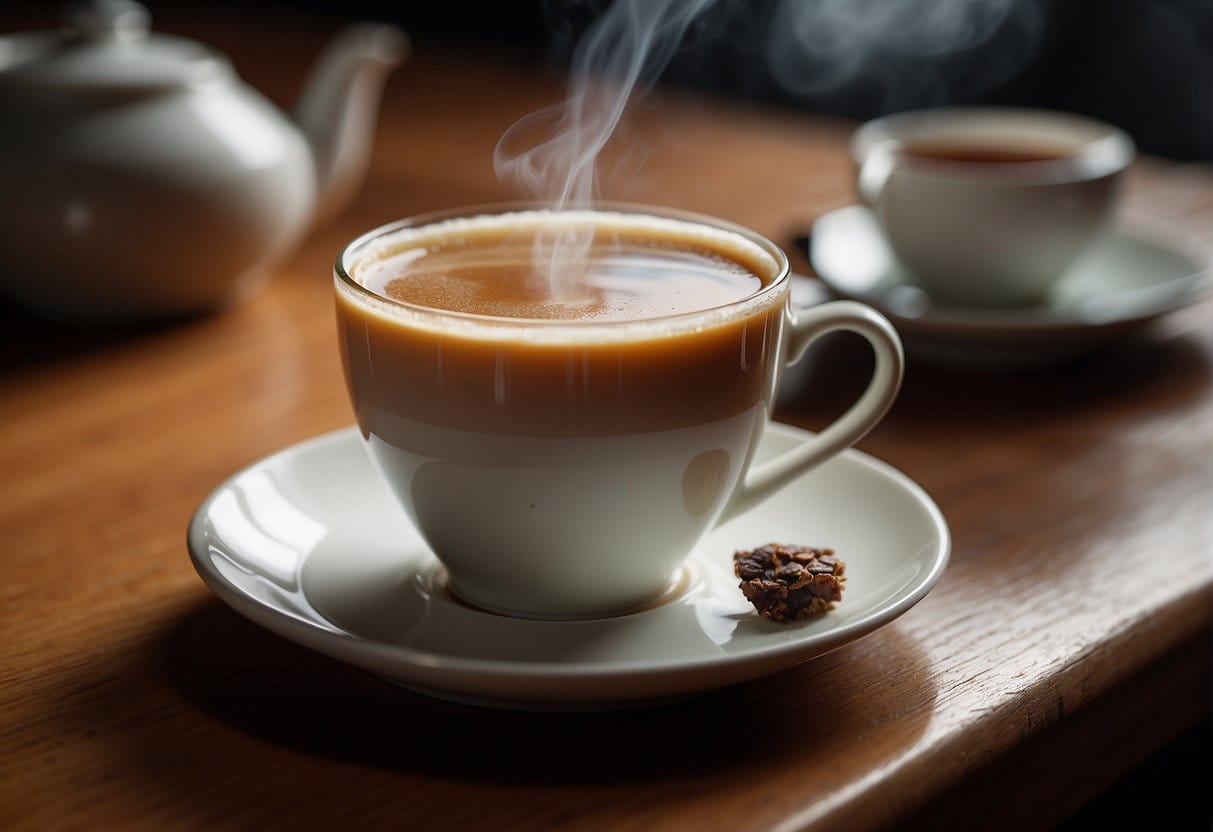
Caffeine is a central nervous system stimulant found naturally in tea leaves. It affects your body in several ways, primarily by making you feel more alert and combating fatigue. However, sensitivity to caffeine varies, so the impact may differ from person to person.
1. Sleep Disruption: Caffeine blocks adenosine, a neurotransmitter that makes you feel sleepy. Consuming caffeine later in the day can interfere with your sleep patterns, potentially causing insomnia.
2. Heart Rate and Blood Pressure: Caffeine can cause a temporary increase in heart rate and blood pressure. If you have heart conditions or hypertension, you should limit your caffeine intake and consult with your healthcare provider.
-
Daily Limits: The FDA suggests that 400 milligrams of caffeine per day is generally safe for most adults. This is roughly the amount of caffeine in four cups of brewed coffee, though tea generally contains less caffeine per cup.
-
Pregnancy and Caffeine: Expectant mothers are advised to limit their caffeine intake, as high levels could affect fetal development.
-
Withdrawal Symptoms: If you regularly consume caffeine and then suddenly stop, you may experience withdrawal symptoms, such as headaches, fatigue, and irritability.
-
Digestive Effects: Caffeine increases stomach acid production, which can lead to heartburn or gastrointestinal discomfort in some individuals.
-
Mental Health: Some studies suggest excessive caffeine consumption may be linked to an increase in anxiety symptoms.
Remember to monitor your caffeine intake and listen closely to how your body responds, especially if you have any pre-existing health conditions. If you notice adverse effects, consider adjusting your consumption accordingly.
Recommendations for Consumption
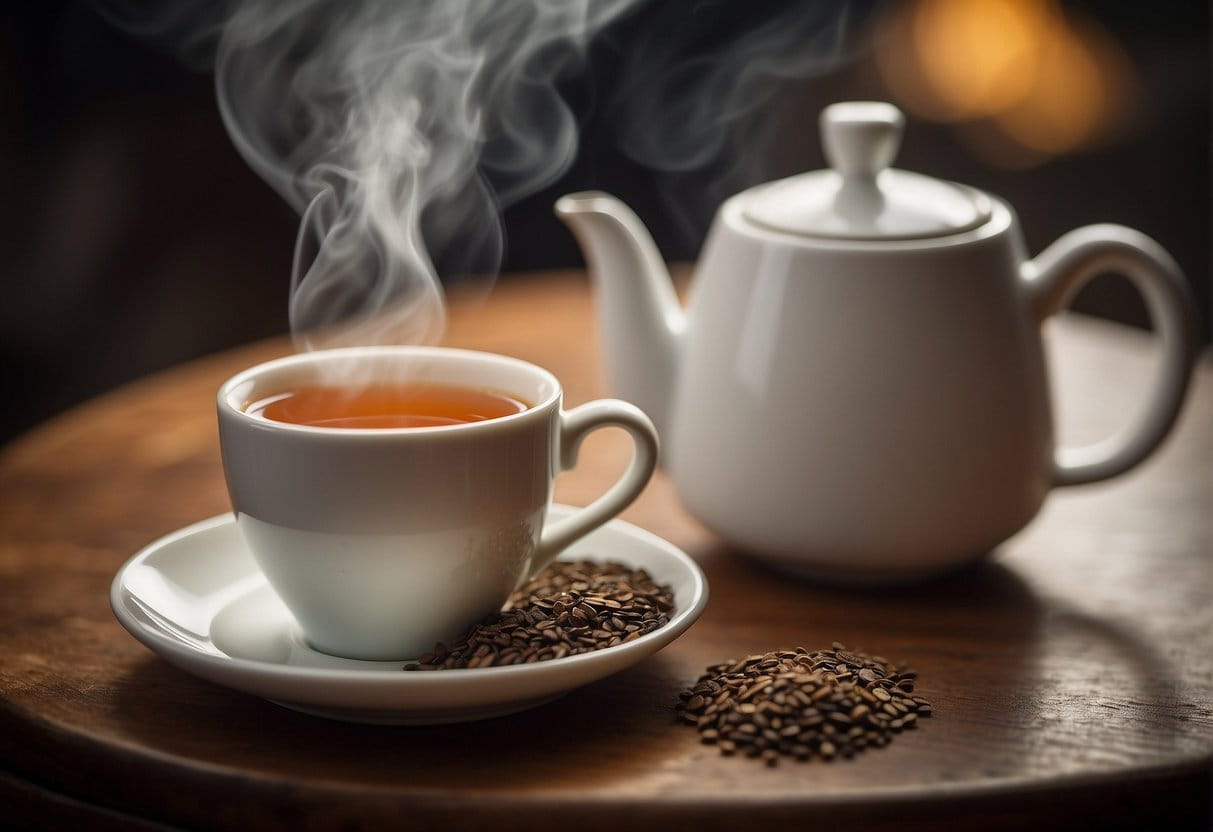
When integrating English breakfast tea into your daily routine, it's important to monitor caffeine intake carefully. On average, an 8 oz cup of English breakfast tea contains about 40-70 milligrams of caffeine.
Optimal Serving Size
- Adults: 1-2 cups daily
- Sensitive Individuals: Consider starting with 1/2 cup
Tips for Moderation
- Morning: Ideal time to enjoy higher caffeine content
- Evening: Opt for decaffeinated versions to avoid sleep disruption
Combining with Other Caffeine Sources
If you also consume coffee, energy drinks, or soft drinks:
- Keep track of total caffeine intake
- Stay within the 400 mg daily limit recommended by health professionals
Health Considerations
- Pregnant Women: Limit to a max of 200 mg of caffeine per day
- Individuals with Health Issues: Consult a healthcare provider before adding caffeine to your regimen
Utilize these guidelines to enjoy English breakfast tea's robust flavor and energizing effects while maintaining a safe level of caffeine consumption.
Frequently Asked Questions
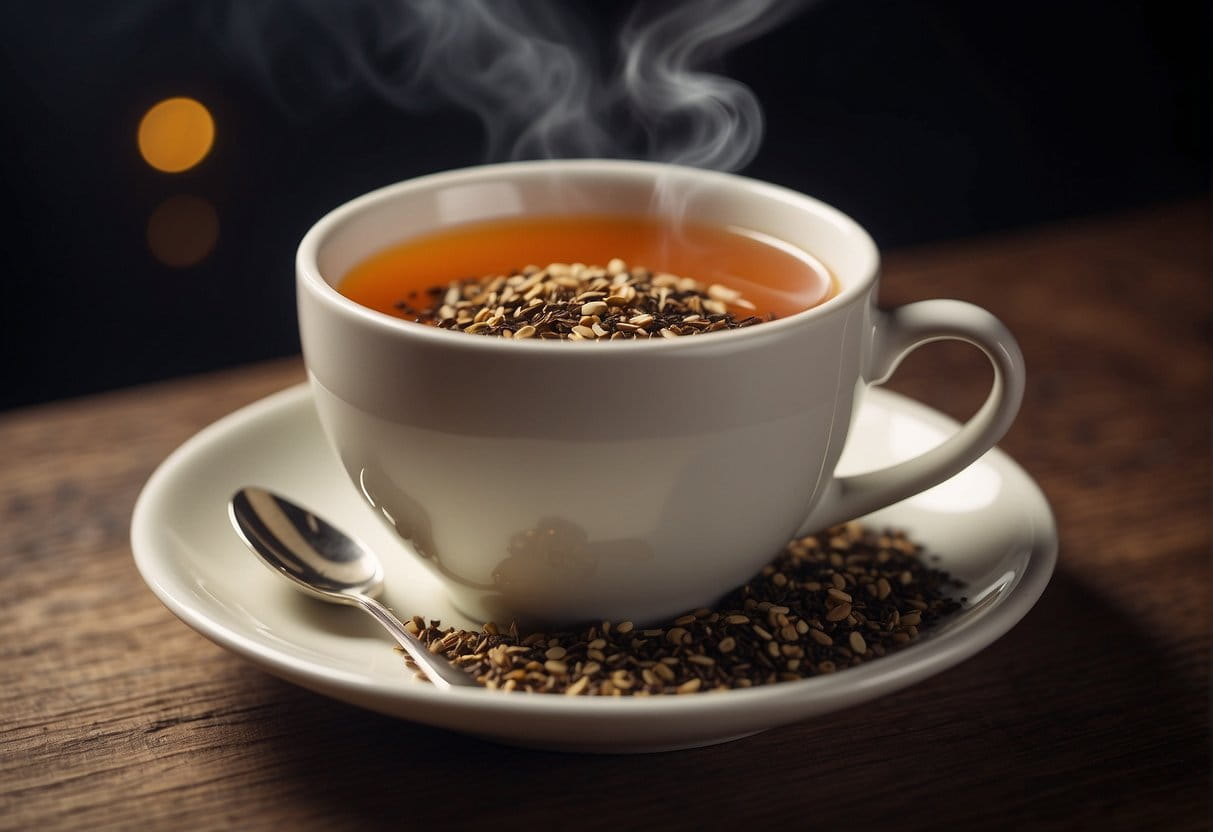
When you choose to indulge in a cup of English Breakfast tea, understanding its caffeine content is as much a part of the experience as savoring its robust flavor.
What is the typical caffeine content per cup of English Breakfast tea?
You can expect your cup of English Breakfast tea to contain between 40 and 70 milligrams of caffeine. This amount can vary based on brewing time and the tea leaves' individual characteristics.
How does the caffeine in English Breakfast tea compare to that in a cup of coffee?
A standard cup of coffee has roughly 95 to 200 milligrams of caffeine, which makes it generally higher in caffeine compared to English Breakfast tea.
Can drinking English Breakfast tea affect sleep due to its caffeine content?
Yes, consuming English Breakfast tea can influence your sleep patterns if you're sensitive to caffeine. Drinking it close to bedtime may lead to difficulty falling or staying asleep.
Is the caffeine level higher in English Breakfast tea or Earl Grey?
The caffeine content of English Breakfast and Earl Grey teas is quite similar. However, English Breakfast tea might have slightly more caffeine due to the blend of robust black teas.
Are there differences in caffeine content between English Breakfast tea bags and loose leaf varieties?
The caffeine content in English Breakfast tea is generally consistent between tea bags and loose leaf forms; however, the leaf size and brewing method can cause slight variations.
What are some low caffeine alternatives to English Breakfast tea?
For a lower caffeine alternative, you might consider herbal teas or decaffeinated English Breakfast tea, which typically have minimal to no caffeine content.
← Older post Newer post →











